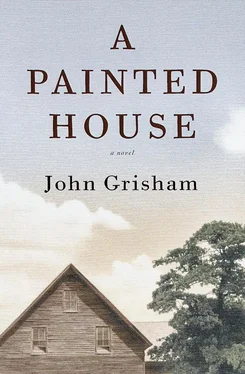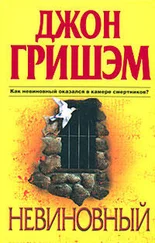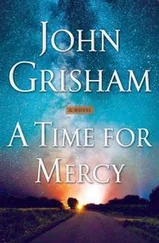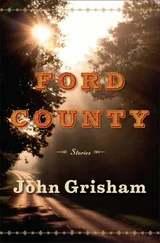It was at this point in Pappy’s narrative that I wanted to bare my soul about Hank. Cowboy had robbed him after he killed him. There was no way of knowing how much picking money Hank had saved, but I knew for certain that there was $250 of Samson’s money now in Cowboy’s pocket. I almost blurted this out as we sat around the kitchen table, but I was simply too frightened. Cowboy was gone, but they might catch him somewhere.
Wait, I kept telling myself. Just wait. The moment will come when I can unload my burdens.
Whatever their finances, it was obvious that Tally and Cowboy had enough money to ride a bus for a long time.
And we were broke, as usual. There was a brief conversation about how to replace the truck in the event that it was never found, but the subject was too painful to pursue. Plus, I was listening.
We ate an early lunch, then sat on the back porch and watched the rain.
Stick’s old, loud patrol car came rolling into the front yard, with our stolen truck right behind it. Stick got out, full of importance because he’d solved the most urgent part of the crime. Black Oak’s other deputy was driving the truck, which, as far as we could tell, had not changed at all. The Spruills ran over, anxious for some word about Tally.
“Found it at the bus station in Jonesboro,” Stick announced as the small crowd gathered around him. “Just like I figured.”
“Where was the key?” asked Pappy.
“Under the seat. And the tank’s full of gas. Don’t know if it was full when they left here, but it’s full now.”
“It was half-empty,” Pappy said, astonished. We were all surprised, not only to see the truck again but to see it unchanged in any way. We’d spent the day worrying about a future with no truck, with no means of transportation. We’d be in the same boat as the Latchers, forced to bum rides to town from anybody passing by. I couldn’t imagine such a plight, and I was now more determined than ever to someday live in a city where folks had cars.
“I guess they just borrowed it,” Mr. Spruill said, almost to himself.
“That’s the way I see it,” Stick said. “You still want to press charges?” he asked Pappy.
He and my father exchanged frowns. “I guess not,” Pappy said.
“Did anybody see them?” Mrs. Spruill asked quietly.
“Yes ma’am. They bought two tickets for Chicago, then hung around the bus station for five hours. The clerk knew somethin’ was up, but figured it wasn’t his business. Runnin’ off with a Mexican ain’t the smartest thing in the world, but it ain’t no crime. The clerk said he watched them through the night, and they tried to ignore each other as if nothin’ was happenin’. They wouldn’t sit together. But when the bus loaded they got on together.”
“What time did the bus leave?” Mr. Spruill asked.
“Six this mornin’.” Stick removed a folded envelope from his pocket and handed it to Mr. Spruill. “Found this on the front seat. I think it’s a note from Tally to y’all. I ain’t read it.”
Mr. Spruill handed it to Mrs. Spruill, who quickly opened it and removed a sheet of paper. She started reading, and she began wiping her eyes. Everybody watched her, waiting without a sound. Even Trot, who was hiding behind Bo and Dale, leaned forward and watched the letter being read.
“Ain’t none o’ my business, ma’am,” Stick said, “but if there’s any useful information, then maybe I need to know.”
Mrs. Spruill kept reading, and when she finished, she looked at the ground and said, “She says she ain’t comin’ home. She says she and Cowboy are gonna get married and live up North, where they can find good jobs and such.” The tears and sniffles had suddenly vanished. Mrs. Spruill was now more angry than anything else. Her daughter hadn’t been kidnapped; she’d run off with a Mexican, and she was going to marry him.
“They gonna stay in Chicago?” Stick asked.
“Don’t say. Just says up North.”
The Spruills began drifting away, backpedaling in retreat. My father thanked Stick and the other deputy for bringing our truck home.
“You’re gettin’ more rain than most folks,” Stick said as he opened the door to his patrol car.
“It’s wet all over,” Pappy shot back.
“River’s risin’ to the north,” Stick said, as if he were an expert. “More rain’s on the way.”
“Thanks, Stick,” Pappy said.
Stick and the other deputy got into the patrol car, Stick settling himself behind the wheel. Just as he was about to close the door he jumped out and said, “Say, Eli, I called the sheriff up at Eureka Springs. He ain’t seen the big one, Hank. The boy shoulda been home by now, don’t you think?”
“I reckon. He left a week ago.”
“Wonder where he is?”
“Ain’t none of my concern,” Pappy said.
“I ain’t through with him, you know. When I find him, I’m gonna put his big ass in the jail in Jonesboro, and we’re gonna have us a trial.”
“You do that, Stick,” Pappy said, then turned around. “You do that.”
Stick’s bald tires slipped and spun in the mud, but he finally got to the road. My mother and Gran returned to the kitchen to start cooking.
Pappy got his tools and spread them on the tailgate of the truck. He opened the hood and began a thorough inspection of the engine. I sat on the fender, handing him wrenches, watching every move.
“Why would a nice girl like Tally want to marry a Mexican?” I asked.
Pappy was tightening a fan belt. There was little doubt that Cowboy hadn’t bothered to stop, open the hood, and meddle with the engine while he was fleeing with Tally, but Pappy nonetheless was compelled to adjust and fix and tinker as if the vehicle had been sabotaged. “Women,” he said.
“What do you mean?”
“Women do stupid things.”
I waited for clarification, but his answer was complete.
“I don’t understand,” I finally said.
“Neither do I. Neither will you. You’re not supposed to understand women.”
He removed the air filter and gazed with suspicion at the carburetor. For a moment it looked as if he’d found evidence of tampering, but then he turned a screw and seemed content.
“You think they’ll ever find her?” I asked.
“They ain’t lookin’. We got the truck back, so there’s no crime, no police tryin’ to find ’em. I doubt if the Spruills’ll go look for ’em. Why bother? If they got lucky and found ’em, what’re they gonna do?”
“Can’t they make her come home?”
“No. Once she gets married, then she’s an adult. You can’t make a married woman do a damned thing.”
He cranked the engine and listened to it idle. It sounded the same to me, but Pappy thought he heard a new rattle. “Let’s take it for spin,” he said. Wasting gasoline was a sin in Pappy’s book, but he seemed anxious to burn a little of the free stuff Tally and Cowboy had left behind.
We got in and backed onto the road. I was sitting where Tally had been, just hours earlier, when they’d sneaked away during the storm. I thought of nothing but her, and I was as bewildered as ever.
The road was too wet and muddy to allow Pappy to reach his perfect speed of thirty-seven miles an hour, but he still thought he could tell that something was wrong with the engine. We stopped at the bridge and looked at the river. The gravel bars and sandbars were gone; there was nothing but water between the banks — water and debris from upriver. It rushed by, faster than I had ever seen it. Pappy’s stick, his flood gauge, was long gone, washed away by the swirling currents. We didn’t need it to tell us that the St. Francis was about to flood.
Pappy seemed mesmerized by the water and its noise. I couldn’t tell if he wanted to curse or cry. Neither would’ve helped, of course, and I think that Pappy, for perhaps the first time, realized he was about to lose another crop.
Читать дальше












